Del reviews ‘Knock at the Cabin’
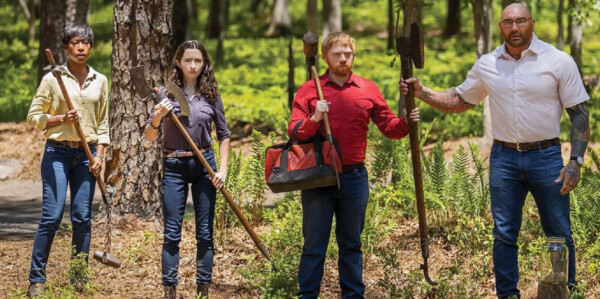
Image courtesy of Universal Studios.
“Knock at the Cabin” Starring Dave Bautista, Jonathan Groff, Ben Aldridge, Rupert Grint, Kristin Cui and others. Directed by M. Night Shyamalan. 1 hour, 40 minutes. Rated R. In theatrical release.
Del’s take
I’m not a fan of M. Night Shyamalan. His stories begin with promise but falter, and by movie’s end I’m feeling robbed of my ticket cost. “Knock at the Cabin” may or may not be one of those movies. I’m undecided. Look at it one way and it’s a good comment on a current problem. Look at it another way and it’s an infuriating concession to another current problem.
“Knock at the Cabin” is based on the Paul Tremblay novel “Cabin at the End of the World,” a much cooler title if you ask me. A gay couple and their adopted daughter spend a weekend at a cabin in the woods and are set upon by four religious cultists who force them to make a choice – sacrifice a member of their family or the world will be destroyed in an apocalypse.
The movie kinda-sorta follows the novel until the last act, when Shyamalan opts for a standard-issue horror movie ending. If I were Tremblay I’d be disappointed but I’ll bet he isn’t. To have your book rendered into a movie by a big-name Hollywood director … well, that’s something, despite the flaws.
The talent is terrific, and let me say right up front that Dave Bautista is amazing. He steals the show. Kristin Cui as the adopted daughter, and Ben Aldridge as the moral compass of the gay couple, are also terrific. Even Rupert Grint does a passable job with American English.
You can look at “Knock at the Cabin” a couple of different ways. As an indictment of the introjected homophobia our culture inflicts on each of us, it’s pretty darn effective. Toward the end Aldridge delivers a soliloquy that sums up the gay point of view on that subject.
Look at it another way, however, and “Knock at the Cabin” suggests there’s something to the conspiracy theories and fear-mongering division perpetrated by QAnon-like fringe element freaks and extremist Republican imbeciles, and in that capacity it provides a horrible disservice to any attempt to inject reason into that conversation.
I haven’t decided which it is. I will say a day or two after watching it I’ve been left with only one strong impression – Bautista is a damn good actor. Everything else was forgettable.
I rate “Knock at the Cabin” a C+. It’s one of Shyamalan’s middling efforts, and the title sucks. At worst it’s a validation of all the kooks and crazies who have made this country the laughingstock of the world.
Del Stone Jr. is a former journalist and author.
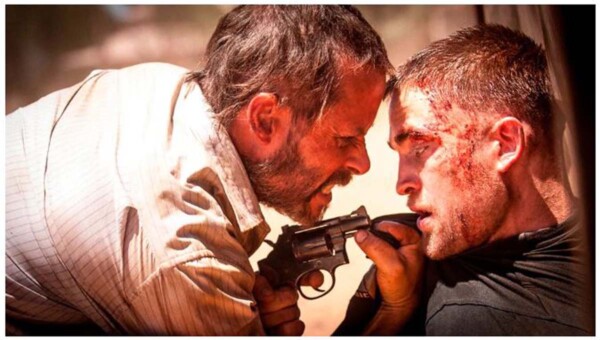
Image courtesy of Roadshow Films.
“The Rover” Starring Guy Pearce as Eric, Robert Pattinson as Rey, Scoot McNairy as Henry, and others. Directed by David Michod. 1 hour, 43 minutes. Rated R. Streaming on most major platforms except Netflix.
Plot summary: It’s the end of the world and Eric’s (Guy Pearce) car has been stolen. He wants it back and sets off to find the thieves. Along the way he encounters the brother of one of the thieves, Rey (Robert Pattinson), who says he knows where his brother Henry (Scott McNairy) is holed up. The two embark on an unlikely adventure across the post-apocalyptic Australian Outback, one in search of justice, the other in search of company.
Spoilers quotient: Low
Del’s grade: B
Mladen’s grade: A-
Del’s take
“The Rover” takes place in Australia, “10 years after the collapse.” I read that and thought, “Hot diggity, a new Mad Max movie.”
Alas, “The Rover” is no Mad Max. It’s one of those “long-stare” movies – you know, the kind where the characters perpetually stare into the distance, at times squinting, like me trying to read the fine print in my homeowner’s insurance policy. Those long stares should be accompanied by something Nietzschean – an abyss, a monster, just some expression of Teutonic fatalism. Alas, there is nothing, which means things have really gone downhill.
What we do get is blood, violence, and cynicism, which is not to say “The Rover” is a bad movie. For what it is, it’s pretty good. But if I want to give up on humanity I’ll watch the 6 o’clock news.
And that’s the thematic imperative of “The Rover” – people are scumbags and the world is for shit. The viewpoint character, Eric, sees people in one of two ways – expendable impediments, or means to an end.
That is until he meets Rey, brother of one of the trio who stole his car. Rey is simple-minded and as such, he functions as an archetype for mankind in its undiluted state, innocent and corruptible, the perfect Petri dish for Eric’s contagious cynicism. And that’s what Eric sets out to do – make Rey as hardhearted as he is. He calls it “learning to fight,” but it’s nothing more than learning not to give a shit about anyone but yourself.
It’s at this point we see a chink in Eric’s armor. As he watches Rey descend into scumbaggery he seems to regret what he’s done, a theme later reinforced by Henry, Rey’s brother, who screams at Eric, “What did you do to him?”
In the final scene we learn why Eric was hellbent on finding his car, offering yet another peek at his shredded humanity while simultaneously illustrating his decline into spiritual suicide. I was hoping for a gesture of redemption and I guess it could be seen that way. More likely it was a final middle finger to the human race.
Framed against the dusty wastes of the Australian Outback, “The Rover” delivers a more depressing statement about the nature of man than many other post-apocalyptic tomes. Everything in its universe is violent, bloody and cynical – in other words, what America will be when the Republicans get through with it.
“The Rover” was well made but it’s depressing as hell. Like I said, if I want a dose of bleakness I’ll watch the 6 o’clock news.

Mladen’s take
This is a chicken-or-egg question. Did the first John Wick movie release before “The Rover” or after? I ask because both films are 2014 cinema and both revolve around the plot point of a man, his car, and a dog, albeit under different conditions. For a moment, I wondered if “The Rover” was a riff on “John Wick” but I dismissed the idea for a couple of reasons. This allowed me to dwell on the austere beauty and simplicity of “The Rover.”
I empathize with the notion that a man’s car is his castle. Where Wick wanted his ’69 Ford Mustang returned, our “The Rover” anti-hero Eric wanted his stolen Holden Commodore back. The Commodore is a sleeper, clean ovoid lines with only its quad exhaust suggesting there are serious newtons – using horsepower to measure engine output is primitive – under the hood.
As Eric roves the Australian outback searching for his Commodore and the contents of its trunk, he finds Rey, the brother of one of the thugs who stole the Holden. Their unlikely partnership serves as the backbone of the movie, which unfolds per my motto in life, “Steady as she goes until you have to pull the trigger.”
Del complains that “The Rover” is a long-stare movie. Sure, in some instances. But you must always keep in mind that it’s staring straight at mankind’s future. And, it’s clear Del wasn’t paying attention when he wiggled his arthritic index finger back and forth at those moments in the movie when very little, if anything, was happening. The disquieting quiet in “The Rover” is backed by a terrific score. When Eric’s broken and nearly remorseless heart allows stoic calm, the score provides the heat.
The acting in “The Rover” is very good even when the script falters here and there. Pattinson as Rey is perfect. Del described Rey as simple-minded and the film’s Eric as a half-wit. Not the case. As it turned out, Rey had a hard time making decisions but, when he finally decided on a course of action, it was executed very effectively. Rey sure as hell had a keen instinct for survival.
“The Rover” is bleak. It is punctuated by violence. The way Eric concluded his first business-like transaction surprised the hell out of me. But, the movie’s atmosphere is plausible. Though the Collapse had occurred, some level of social organization was still present. The norm that killing people was bad still had some sway. The Australian government was trying to enforce laws. Cargo trains still ran. Food, water, and gas were available for the properly denominated payment.
I give “The Rover” an A-. There are a couple of notable bits of dialogue. The movie isn’t too long and, as I already mentioned, the acting is very good and the score top notch. The high rating, a portion of it anyway, might be an artifact of the trauma Del dropped on my head with the last two movies he had me watch. Compared to “Leave the World Behind” and “Saltburn,” the version of dystopia portrayed in “The Rover” seemed uplifting.
Mladen Rudman is a former journalist and technical writer. Del Stone Jr. is a former journalist and writer.

Image courtesy of Warner Brothers.
—
“Terminator Salvation” Starring Christian Bale, Sam Worthington, Anton Yelchin, Moon Bloodgood. Directed by McG. 114 minutes. Rated PG-13.
Mladen’s take
Take a little “Total Recall,” mix it with “Transformers,” sprinkle a tablespoon of “Mad Max,” bake at 350 degrees computer-generated special effects, and, voila, the result is “Terminator Salvation.”
“Salvation” is unable to compete with any of its three predecessors but it ain’t a bad film. One weakness is its PG-13 rating. There are plenty of explosions, but no close ups of bullets or shrapnel shredding bodies, or robo-hands tearing off heads.
The principal difference between “Salvation” and the other Terminator movies is that John Connor, humanity’s salvation, is now an adult and Kyle Reese, Connor’s father, is a child. Nevermind, it’s not worth explaining.
In the first three movies, the objective is to keep Connor alive. In the fourth, it’s making sure Reese avoids ingesting 40 7.67-mm rounds per second from a minigun.
Christian Bale, as Connor, plays what has now become a potentially career-ending typecast for him, a brooding, mopey hero.
The most interesting character in “Salvation” is the machine army’s first T-800 cybrid assassinator, which is unaware of its origin or allegiance. Sam Worthington portrays the cybrid, known as Marcus Wright.
Once you overlook the murkily explained way Wright becomes the next-generation terminator, his portrayal of a sentient machine enduring an identity crisis is fairly convincing.
Add to Worthington’s character the lovely and very human sidekick, A-10 pilot Blair Williams, and “Salvation” becomes more than palatable. Williams is played by Moon Bloodgood, a beautiful woman with the sexiest voice on the planet.
Typical of Armageddon-like movies, the post-apocalypse Earth in “Salvation” is drab browns, dark blues and assorted grays. Only flashing red lights and the orange of explosions adds color to the film.
It takes some suspension of contextual logic to consider mankind’s resistance against the encroaching world of a computer constellation with artificial intelligence plausible.
For example, if Skynet, the Vladimir Putin of the machinekind in “Salvation,” is so smart, lethal, and efficient, why did it fail to nuke all of America’s military bases and repair depots? I ask because the humans in the film have access to a broad range of weapons. From MV-22s to a nuclear-powered attack submarine, Connor and his troops avoid the uncomfortable position of fighting robots with clubs and rocks.
“Salvation” gets three stars out of five, if for no other reason than its respectful bow toward the end to the greatest terminator of all, the now politically besieged governor of California.
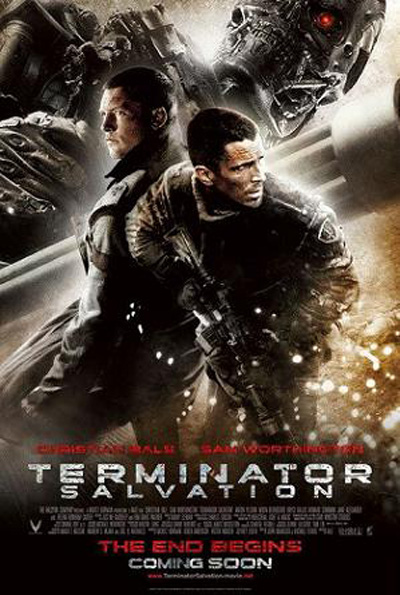
Del’s take
Let’s see if I can nail down the premise of “Terminator Salvage Operation”: John Connor must jack into the Matrix where his mentor Obi Wan has been captured by an alien face-hugger. There he meets Gandolf, who wields a mean club when the Road Warrior attacks, but they escape with the aid of Mr. Spock who is undergoing the colon-cleansing ritual of pon-fart.
I swear. There were times during “Terminator Salvation” when I thought I was watching “The Road Warrior,” “Transformers” and maybe just a wee bit of “Star Trek,” “Alien” and “Lord of the Rings.”
These science fiction franchises have become about as interesting and fun as a civil service employment application. They’re way too complicated and take themselves way too seriously, and their creators seem to have forgotten that story will always trump effects.
Worse, they’re all borrowing stuff from each other, sort of like a taco pizza cheeseburger.
Here’s the rundown on “Salvation”: It occurs after “Judgment Day,” the day a vast computer system called Skynet becomes self-aware and decides to pan-roast humanity with the nuclear bombs it has been put in charge of (and this date conveniently shifts from movie to movie. In the original “Terminator” it was Aug. 29, 1997. In “Terminator 2: Judgment Day” it’s July 25, 2004, presumably because of meddling in the timeline. In the TV show “Terminator: The Sarah Connor Chronicles” it’s moved to April 2011 … can’t they just settle on a date and be done with it?).
After pushing the button Skynet decides to rid the world of pesky human survivors by building a global network of machines that work 24/7 to hunt down human beings and kill them. Humanity, deprived of its Netflix popups and angry because of it, retaliates by organizing resistance fighters who live underground, eat rats, and have access to phase plasma rifles in the 40-watt range (an homage … get it?).
John Connor, the anointed savior of mankind, must make sure his dad, the teenaged Kyle Reese, lives long enough to go back in time and impregnate his mother, Sarah Connor. Meanwhile the first human-like Terminator awakens and thinks he is human, never believing he might have been programmed to do what he spends most of the movie doing. Amazingly he bumps into Reese, one of two survivors living in Los Angeles, and then the movie becomes one big fist punching, guns blazing, jets screaming, atomic-bomb exploding craptravaganza.
I was wrong. This isn’t a civil service employment application; it’s Donald Trump’s tax return.
Christian Bale becomes tiresome as the eternally brooding, always angry John Connor. I keep remembering that insane tirade (warning: extremely foul language) by Bale posted on the Internet where he threatened to beat the &@$% out of the director of lighting for interrupting his shot. Moon Bloodgood irritates me because her name is so obviously contrived. And how did Anton Yelchin (“Star Trek”) score two of the biggest movies of the summer season?
One bright note is Sam Worthington as the Terminator who doesn’t know he’s a Terminator. Oops! Spoiler? No problema, baby. It’s telegraphed in the first five minutes.
I have two regrets about “Terminator Salvation.”
No. 1: There was no “Battlestar Galactica” tie-in.
No. 2: I spent $7 seeing this in the theater when I could have waited for it to show up in the $5 bin at Walmart.
From what I hear there’s a T5 in the making.
I guess the Terminator will be back.
Mladen Rudman is a former journalist and technical editor. Del Stone Jr. is a former journalist and author.
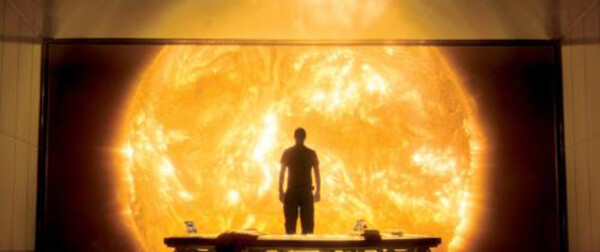
Scene from SUNSHINE
“Sunshine” Starring Cillian Murphy, Chris Evans, Rose Byrne, Michelle Yeoh. Directed by Danny Boyle. 107 minutes. Rated R.
Del’s take
I read the hype for “Sunshine” and was prepared to have my socks blown off. When Kari offered to let me borrow her Netflix rental I jumped at the chance, even splurging on a pizza for what was pitched as the reinvention of the science fiction movie.
I can sum up my opinion of “Sunshine” in five words: Stupid people doing stupid things.
“Sunshine” is like that gorgeous blond you admire from afar until you work up the courage to introduce yourself … only to realize minutes later this is perhaps the dumbest person you’ve ever met in your life.
What a disappointment.
In “Sunshine,” the sun is dying. But humanity has scrounged every bit of its fissionable material to build a bomb that will create a “sun within a sun.” (What a stupid premise – even if a bomb the size of Earth itself were hurled into the sun the effects wouldn’t be significant. But don’t get me started.)
Our crew must fly the spacebomb (like this movie) into low solar orbit, launch the bomb and skedaddle before their butts are fried. They represent the second such attempt; the first ship mysteriously disappeared.
As they approach the planet Mercury they detect strange radio signals – it’s the first spaceship, adrift in that charbroiled region of space. Should they change course and attempt a rescue? (No!, you’re screaming at the screen. The fate of humanity rests on the success of your mission! Don’t sacrifice an entire planet for the eight-member crew of another spaceship who are probably dead anyway!)
But OF COURSE they change course (stupid). Then, one of the engineers forgets to reorient the shields and the spacecraft is threatened with incineration (really stupid). In order to fix it they must go outside and manually lower the shield plates. In the process the captain gets incinerated (beyond stupid) and the greenhouse, which generates their oxygen, is burned up (conveniently stupid). So they’re forced to rendezvous with the other ship … which just happens to be haunted by the insane spirit of its microwaved captain … he manages to find his way to the second ship and wreak havoc. …
I won’t tell you how “Sunshine” ends because (a) you shouldn’t care, (b) you should have switched off the DVD player and tuned in “Extreme Home Makeover,” and (c) it’s stupid.
My advice is stay away from this train wreck of plot holes, logic flaws and non sequitors, and use your time for a more meaningful pursuit … like watching ice melt.
“Sunshine” gets five yawns.

Mladen’s take
The pizza Del ate watching “Sunshine” must have gone down wrong. But, instead of getting heartburn, Del fell victim to brain-burn.
“Sunshine” is a fine movie with very good special effects that don’t overwhelm the plot.
The movie has a purpose.
It’s about sacrifice and conceit. It’s about hope and despair. And it has a couple of cute and brainy ladies as co-stars.
Slowly unfolding mishaps, each more consequential than its predecessor, transform the 90 million mile journey to save Earth from amiable boredom in the beginning to a tense, other-worldly sci-fi thriller toward the end.
Del mocks the scientist that forgot to reset Icarus II’s sunshield, which jeopardized the mission, after changing the vessel’s course to rendezvous with a derelict spaceship.
But Del, a rabid space exploration enthusiast, has conveniently forgotten a real-life incident Sept. 23, 1999.
Hyper-trained scientists working to put NASA’s $125 million probe Climate Orbiter in orbit around Mars confused each other when one team used English measure units — inches, feet — and the other, metric units — centimeters and meters.
The likely result was an expensive machine plummeting through the Red Planet’s atmosphere and burning up.
People do make mistakes — I mean look at what the Supreme Court did when it put Bush into the White House nearly eight years ago — and that’s a fact.
“Sunshine” doesn’t have the majesty or grandeur of, say, Kubrick’s “2001: A Space Odyssey.”
But, its ending is intelligible and, ultimately, redeeming.
“Sunshine” is good enough for me to consider adding it to my DVD collection, right there next to “Godzilla vs. Megaguirus.”
Mladen Rudman is a former journalist and technical editor. Del Stone Jr. is a journalist and author.
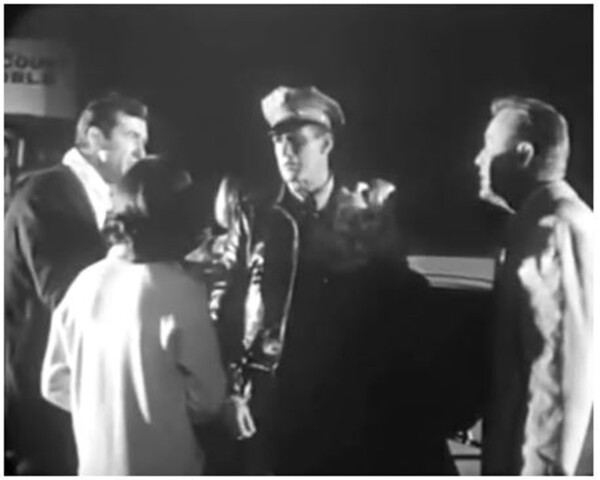
Image courtesy of GPA Productions.
“This Is Not a Test” Starring Seamon Glass, Thayer Roberts, Aubrey Martin, Mary Morlas, Michael Greene and others. Directed by Frederic Gadette. 1 hour, 13 minutes. Unrated. Streaming on YouTube, Internet Archive.
Plot synopsis: A sheriff’s deputy sets up a roadblock on a lonely mountain road early one morning after receiving word of a possible nuclear attack. Soon several motorists gather at the checkpoint and must work together to save themselves.
Are there spoilers in this review: No.
Del’s grade: C-
—
Del’s take
The Bulletin of Atomic Scientists has published a Doomsday Clock, a metric to measure the risk of nuclear war, since 1947 when the clock was set to 7 minutes to midnight.
In 2024 that clock was set to 90 seconds to midnight. Given recent events in Ukraine, Gaza and Israel-Iran, 90 seconds is not only prudent but generous. It reminds those of a certain age that while the Cold War may have been waged 60 years ago, history has an odd way of repeating itself when humanity takes its eye off the ball.
A number of movies from that era reflect the national angst over atomic warfare, movies like “On the Beach,” “Fail Safe” and “Doctor Strangelove.” Add to that cinematic paranoia the 1962 film “This Is Not a Test,” a low-budget production that comes nowhere near the quality of a “Fail Safe” or “Doctor Strangelove” but serves one useful purpose, that of cautionary tale. It’s just not the “cautionary” you might expect.

“This Is Not a Test” was filmed in 1962 in Los Angeles County. Because none of the actors are known, they aren’t listed in the credits. No release date was given, but the studio was listed as GPA Productions.
How is the movie cautionary?
Apart from the obvious – that nuclear war is bad – it serves as a reminder to those who would take us back to the “good old days” (Are you listening, MAGAts?) that those times weren’t really all that good. Watching “This Is Not a Test” in 2024 shows us how far we’ve come as a society, and how far we’ll fall if we give in to the forces of ignorance and hate that would turn back the clock, in this case toward a social doomsday.
In “This Is Not a Test” the characters exhibit blind obedience to and trust in authority, embodied by the sheriff’s deputy, who over the course of the film evolves into a cruel autocrat. The motorists, i.e. “voters,” follow his commands without complaint or question, handing over their car keys and unloading a truck to use as a makeshift bomb shelter. I’m hard pressed to say people of today would behave like that given the sizeable number of voters who would entrust their freedoms to a criminal and traitor. But at least some of us have grown as human beings over the years.
Women are treated like property. That was often the case in movies from this period, but in “This Is Not a Test” women operate almost exclusively as instruments of male dominance and facilitators of their own downfall. A wife cheats on her husband with another man and the husband meekly skulks away. One man wins, another man loses, and the woman? She means no more to the story than a knife or a gun, used to achieve those ends.
Booze unloaded from the truck becomes a symbol for disrespect, not only for the deputy’s authority but for human decency itself. Those who consume it are depicted as morally bereft and unworthy of salvation.
And then there’s cruelty to animals, horrifying by today’s standards. In one scene a mentally ill man destroys crates carrying chickens and hurls live birds into the ground. In another scene the deputy chokes a woman’s poodle to death because it’s using up all their oxygen. Animals don’t even figure into the equation of life.
So yeah, the “good old days” weren’t really all that good, and while I understand that when people yearn for the past they’re talking about gas that cost 30 cents a gallon or Momma’s homemade biscuits, they need to remember there were other things about the past that weren’t so great, and maybe what we have today ain’t so bad.
“This Is Not a Test” is not particularly well written or acted, and it doesn’t measure up to those other movies I mentioned. But it’s useful in showing us just how much we’ve grown as a society, and how far we’ll fall if we turn the clock back to the doomsday of the past.
I give it a C-.
Del Stone Jr. is a former journalist and writer.